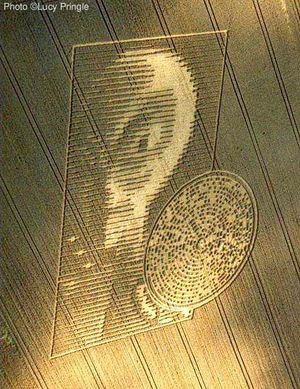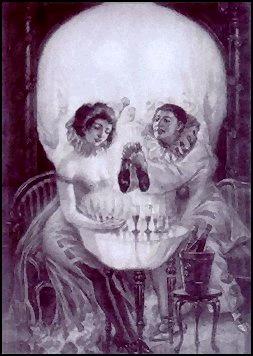Subliminal Advertising
This article is too close to the TRUTH! Citizens should begin to feel uneasy or bemused now. Fnord. |
Subliminal advertising flashes words and images or text onto a screen faster than the conscious mind can read or decode them or, in printed advertisements, conceals such images and text by distorting them, surrounding them by meaningless squiggles and shapes, or placing them in unexpected locations. Nevertheless, the images and text are understood on an unconscious level and may affect the behavior of the audience who is subjected to such images or text.
HUFF MORE KITTENS
Techniques[edit | edit source]
Sometimes, the pictures or the words create visual or linguistic puns. Other clues are provided by the directions in which models in the advertisements look, their postures and body language, and their facial expressions. The subliminal elements often appear in the upper left corner of the advertisement, in ice (which is painted, not real), in bottles, and in the faces or bodies of the models. Symbolism is also used to guide the unconscious mind into interpreting the subliminal clues in a specific way, and, often, a phrase or a short sentence, sometimes employing a pun, indicates how the advertiser hopes the viewer will interpret the advertisement. Subliminal advertisements often include pictures of sharks or skulls that allude to death, genitals and words suggesting sex, and landscapes associated with strong emotions and desires.
In Uncyclopedia[edit | edit source]
Often, if you look hard enough in Uncyclopedia you will be able to find subliminal advertising. It is disguised as humor in many articles, however it is often wildly unamusing.
HEIL HITLER
Intentional Character[edit | edit source]
Those who doubt that subliminal techniques are deliberate should remember that advertisers spend thousands, even millions, of dollars on subliminal advertisements and advertisements are carefully executed with props and models placed and posed by design.
Divine or Natural Prototypes[edit | edit source]
It is believed that subliminal advertisements started as a result of the perception of familiar shapes in rock formations, tree bark, clouds, and other natural landscape or environmental features.
Some people believe that such shapes, especially those that bear a strong resemblance to Jesus or the Virgin Mary, as they have been conceptualized by artists, are God’s handiwork and, as such, are miraculous.
Others believe that the shapes are simply the results of accidents, coincidences, or, in some cases, wishful thinking.
However, the fact that people can and do see (or imagine) shapes in otherwise shapeless objects led advertisers to create ambiguous images within images that suggest similarities, characteristics, and meanings that would not otherwise be perceived in relation to the goods and products in the manipulated photographs and drawings that advertise them.
Examples[edit | edit source]
Knowing the clues for which to look enables viewers to spot subliminal messages in print advertisements. Perceiving them in movies is more difficult, even when subliminal techniques are understood.
The Little Mermaid[edit | edit source]
The Little Mermaid, an animated feature film from the Walt Disney Studios, supposedly was directed at young children. However, scrutiny of the picture of the castle shown on the film’s DVD cover reveals something in which no little boy or girl should have an interest--an erect phallus. For this reason, the castle is often referred to as the “phallus palace.”
It was claimed that a disgruntled Disney artist painted the phallus as part of the palace to avenge himself against the company, but Disney officials deny this anecdote, alleging that the resemblance is purely coincidental. Uh huh.
The fact that the artwork was used to illustrate the DVD cover would seem to disqualify it as an example of subliminal advertising, but the same image was also used extensively in promotional materials, including theatrical posters, and accompanied the movie’s premiere.
Initially, the phallus may not be conspicuous, because it is hidden, as it were, albeit in plain sight, among the spires of the castle. However, a closer look will reveal the towering penis. It is located above and between Ariel (the Little Mermaid) and her suitor, the prince.
Mickey Moo[edit | edit source]
This advertisement is an example of how genetic engineering can be abused by powerful corporations to create living, breathing, mobile advertisements that promote their goods and services. This cow, dubbed “Mickey Moo,” is the result of millions of dollars in the funding of experimental research that was intended to direct and control the development of patterns of markings in animal fur. The result, in this case, is the apparent silhouette of a famous cartoon mouse. Again, it may be difficult to discern the image at first, but closer study soon discloses the outline. It is located on a slight diagonal line that begins just above the animal’s left foreleg.
Government-sponsored Subliminal Art[edit | edit source]
The U. S. federal government has commissioned and patronized many subliminal works of art in its effort to propagandize and otherwise brainwash its citizenry.
Mount Rushmore[edit | edit source]
From a distance, this mountain looks like the natural land mass that it should be.
However, as one draws nearer to it, its subliminal elements can be discerned by viewers’ unconscious mind, and, as a result, whether they consciously recognize the three-dimensional sculptures of four U. S. presidents, they are likely to think of these presidents as having been great men who were larger than life and made great contributions to their country.
Crop Circles[edit | edit source]
It is rumored that the Central Intelligence Agency (CIA), taking advantage of the superstition rampant among a segment of the population to which it refers as “gullible Americans,” created this supposed crop circle to persuade them that the world, especially Dumb Ass, Wisconsin, where this crop circle cropped up, is being visited by extraterrestrial beings. The purpose of this rumor, it is thought, is to convince gullible Americans that the federal government needs to increase taxes to astronomical levels in order to fund secret weapons systems and Star Wars technology capable of defeating these invaders from beyond the stars.
Other Countries’ Subliminal Propaganda[edit | edit source]
The U. S. is not the only country to use subliminal techniques to propagandize its people, nor was it the first. This example of subliminal propaganda is the product of late twentieth century British artists who, hired by the British government to create an image that would, as one official put it, “promote virility” in a time of “decreased population growth,” backfired, promoting sex among homosexual men, which, by definition, is not procreative, while “angering heterosexual men and women, who found the figure disgusting,” whereupon the government distributed the false cover story that the figure represents “a 400-year-old fertility symbol” created by the Celts who inhabited the land at that time and may have been intended as a portrayal of the Roman hero Herakles (Hercules).
Disguised Subliminal Advertisements[edit | edit source]
The American public has become increasingly sophisticated at recognizing subliminal advertisements and propaganda. As a result, artists, advertisers, psychologists, and petty bureaucrats have begun calling subliminal advertising “art” or “optical illusions” and have attempted to become cleverer in their expressions of subliminal advertising. To maintain the illusion that such advertising is art, the government has paid professional artists to create art that is based on optical illusions and does not promote any specific goods or products. A well-known example is the partying couple who may or may not also be a giant skull.
However, as the public accepts the idea that subliminal techniques are artistic rather than commercial in nature and purpose, advertisers have begun, once again, to use them to sell their clients’ goods and services. This advertisement, which was published in House Beautiful with the caption, “Is your house appealing or appalling?”, was disguised as a complicate work of art, but it actually advertises a home decorator’s business.












